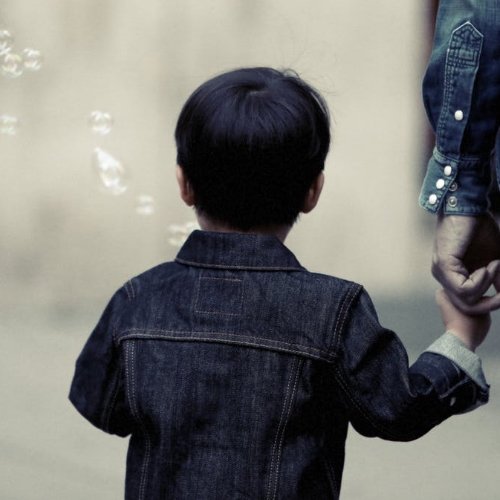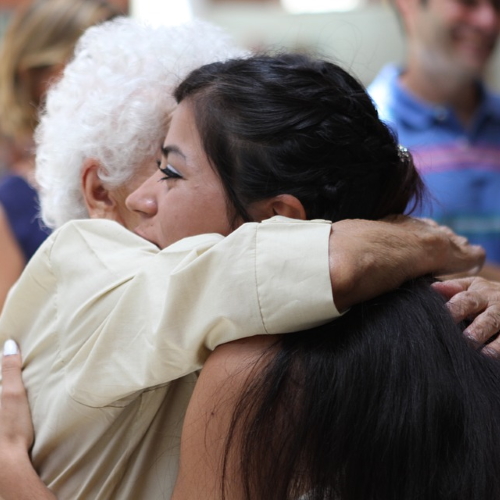My Spouse/Partner Was Diagnosed With Cancer:
3 Things To Remember
Marriages and long-time relationships are a beautiful thing. There is something precious about wholly promising your life to someone else and having them do the same.
This commitment can also be challenging at times, especially when outside stress knocks at your door. Sometimes, that stress is a cancer diagnosis. So, how do you manage that?

Barbara Kivowitz went through her own chronic illness, and her experience encouraged her to write a book about the patient-caregiver relationship between married couples. She says there are three very common themes across these marital and long-time relationships to keep in mind: the difference in experiences, the role shift, and the protection racket.
1. Your experiences of the illness are going to be different.
“For the patient, they’re experiencing it in their body. For them, it can be a profound existential crisis. They were one thing, they don’t know exactly who they are right now, and they don’t know who they’re going to be. The patient may need some quiet time to process these new forces in their life,” Kivowitz says.
”For the caregiver, the experience is very different. One of the people they love most is at risk. They are driven to problem solve. They want to make it better. They want to do. That can be a potential point of collision.”
This is why communication is so important. Both of you are going through the same thing, but you’re going through it in a completely different way.
Your fears might be similar, but they are not exactly the same. Therefore, your needs are going to be different.
Many TPS community members who have been through treatment recommend therapy or counseling of some kind. A therapist can create a helpful, safe environment in which both partners can express their thoughts, fears, and needs.
Casey Head went through a long process with leukemia, and she solidifies the claim by suggesting proactive counseling. Get out in front of it and come up with coping strategies before problems come up.
“I would recommend immediately going to see a therapist. Even if you know you have a really strong relationship, there are so many tools they can give you.”
Melissa Vaughan has multiple myeloma, and she says therapy was a great move for her family.
“A diagnosis is uncharted territory. There’s just as much stress on the caregiver as there is for the patient. We chose to go to counseling so he could help us navigate the best ways to communicate.”
Shannon Mercurio is a colon cancer survivor and speaks to those emotional needs that pop up after diagnosis. It can be hard to learn on the spot what you need after being thrust into an ocean of stress.
“When you go through a cancer diagnosis, all of the sudden you have these emotional needs that you didn’t know existed. Your partner doesn’t necessarily know what they look like. In a moment, life has changed, and your partner is dealing with this new fear and diagnosis just as much as you are.”
2. Your roles might shift, and that’s okay.
“You go from equals to patient and caregiver. That can be a game changer. For some partners, that becomes so embedded and prolonged over time, they lose their adult intimate connection,” Kivowitz says.
This can make it hard to revert back to normalcy after the patient recovers.
Many in our community have said that having their life to look forward to was what kept them going through hard times of their treatment. It’s important to balance caregiving with still being a spouse/partner.
“Unfortunately, he became more of a caregiver while I became a patient. I didn’t like that position. I think it brought out a lot of insecurities in me, especially being in a newer marriage,” Vaughan says.
It can be very difficult for someone who has been healthy their whole life to relinquish their ability to take care of themselves. As a caregiver, remember to take care of your partner’s pride. As a patient, be humble and remember that this will pass.

3. You don’t need to protect your spouse/partner.
“Another issue is the protection racket where neither one wants to say anything that would hurt the other one. They assume that if they were to speak about what’s in their gut and their heart, to speak about their emotions, whether that’s fear or anger or frustration, that it might somehow cause harm or break things.”
What winds up happening is each person is roiling with their own inner experience and not talking about it. What they wind up talking about ends up being more superficial and their connection is a little more fragile when they really need each other the most,” Kivowitz explains.
Cheyann Shaw and her husband had to be apart for a few months of her treatment for stage 4B ovarian cancer. She talks about how she and her husband had to keep communication very open, especially since they couldn’t be present physically.
It did more harm than good when she closed the channel of communication in an effort to protect him.
“At times, I would push him away because I didn’t know what was going to happen to me. I didn’t want him to not have me, so I would push him away to prepare him, but that did more harm.
It caused more tension, and that’s one thing you don’t need when you’re going through cancer.”
Showing your vulnerabilities gives the other person an opportunity to step up and be strong for you.
A caregiver can do this, but so can the patient. Nicole Body, a soft tissue sarcoma survivor, gives the perfect example of this.
“Even if you are a patient going through it, you still have so much to offer your spouse too. I remember he was so tired when I was going through chemo treatment.
One time, he crawled up in the hospital bed, and he fell asleep on my chest. Knowing that I was needed, and I could be a safe place for him too was one of the most beautiful moments I have ever experienced in my life.”
Remember that your individual experiences of the same circumstance are different. Your perspectives are different. Your fears might be similar in ways, but they are different in others.

Always keep an open line of communication and you will find that you can understand each other’s perspectives, address each other’s needs, not lose who each of you are, and come out on the other side stronger than you were before.
Patrick Mulick reiterates this idea as he talks about his wife taking on so many roles and keeping their lives running while he fought non-Hodgkin lymphoma for his.
“I wish cancer on no one, but some of the joys I’ve gotten from it, I wish for everybody. The way in which it brought my wife and I closer together was amazing.
It was a stress, and it was difficult, but we got through it together. I couldn’t have done it without her. Her support was nothing short of amazing.”





